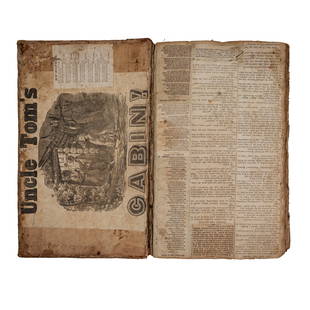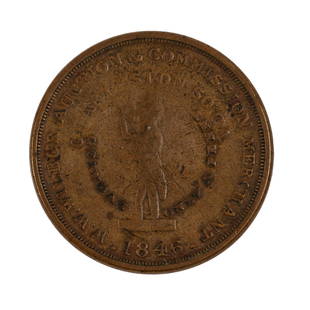
1864 Account book of Lincoln's telegrapher
Similar Sale History
View More Items in Books, Magazines & Papers
Related Books, Magazines & Papers
More Items in Books, Magazines & Papers
View MoreRecommended Collectibles
View More










Item Details
Description
Author: Eckert, Thomas T.
Title: Manuscript account book for 1864 of Thomas T. Eckert, Chief of the War Department Telegraph Staff from 1862–1866
Place Published: [Washington, D.C]
Publisher:
Date Published: 1864
Description:
Near daily manuscript entries on the pages of an 1864 Pocket Diary, published by Denton and Wood. 10x16 cm (4x6¼") full black leather with attached wrap-around wallet and flap, edges gilt.
Original Civil War Era diary was kept by President Abraham Lincoln's close confidant and "Master of the Military Telegraph" Thomas T. Eckert (1825-1910). All entries are in Eckert's hand and chronicle his daily life in and around Washington, D.C. and on various trips he took on behalf of the War Department. During the course of the war Eckert rose through the ranks, eventually receiving a brevet to brigadier general of volunteers in 1865. Edwin Stanton appointed him Assistant Secretary of War in 1866.
The year 1864 was a notable one for Eckert, as his friendship with President Lincoln deepened and his telegraphing job responsibilities intensified. This was also the year in which Eckert famously thwarted a Confederate plot to torch several sites in New York. In the previous year, Eckert was appointed the head of the Washington, D.C. office, as Assistant Quartermaster of U.S. Army and Assistant Superintendent of the U.S. Military Telegraph. Other telegraphers with whom he closely worked in Washington D. C., namely Colonel Anson Stager, Charles A. Tinker, and Albert Brown Chandler, are all mentioned in the present volume. Together with Eckert, this talented team of telegraphers devised ciphers used to communicate secret messages during the war. Col. Stager, who is frequently mentioned, is credited with co-founding Western Union along with Ezra Cornell who later co-founded Cornell University upon his retirement from Western Union.
Entries here include Eckert's meetings with various military officers including General Ulysses S. Grant, General Benjamin Butler, General George Meade, and others. Eckert's "work supper" with Gen. Grant on July 1st, 1864 took place at General Grant's City Point (now Hopewell), VA headquarters, which Eckert frequently mentions. Ever mindful of the war time sacrifices being made, Eckert writes on Oct. 4th, "Subscribed to the Chronicle to be distributed away to soldiers in field & hospitals". His benevolent nature is revealed in other entries as well, such as on March 4th when he writes "Paid poor woman refuge from Dixie (Southern state)" and on May 21st when he states "Paid for rat dog that ran away". Also chronicled here are Eckert's various trips pertaining to his work with the War Department to places such as New York, New Jersey, Philadelphia, Baltimore, and Harrisburg. Many diary entries involve his wife "Emma" (Eckert's wife Emma D.Whitney), to whom he often delves out spending money. In a heartfelt entry on the couple's Dec. 12th wedding anniversary, he writes "14th Anniversary of my married life. Without a single regret." At one point Emma travels home to Ohio for a visit with family and Eckert writes about her letters sent from Cleveland and Cincinnati. Diary also bears numerous entries for the purchase of cigars, as the cigar-chomping Eckert, who sometimes refers to himself in first person as "Eckert", keeps himself well supplied. Also many entries here for "ale" and one page bears entries for the purchase of both "cocaine" and "whiskey".
President Abraham Lincoln trusted Eckert to such a great extent that he asked Eckert to accompany him to Ford's Theater on the night of his assassination. Like Lincoln, Eckert was an avid fan of the theater as evidenced by various entries in the present diary for theater tickets including a number of entries in which Eckert mentions Ford Theater by name. Unlike Lincoln and Eckert, Secretary of War Stanton considered theater a frivolous waste of time and forbade Eckert from accompanying Lincoln to Ford's Theater on the fateful night of April 14th, 1865. Stanton claimed Eckert had an important work-related task for him to perform that night, when in fact this was not true. As a result of Stanton's urging, Eckert famously spent the evening at home rather than at the president's side, giving rise to endless conspiracy theories. Eckert's Ford theater entries here further corroborate his fondness for that infamous venue, and fortify the many conspiracy theories.
While managing a gold mine in North Carolina in 1861, Eckert was accused of being a Northern spy. When his case was heard before a judge, he was acquitted due to a lack of evidence and quickly fled with his family back north to Cleveland. As a result of his experience, Eckert telegraphed Assistant Secretary of War Thomas A. Scott upon his arrival in Cleveland that his services were available to the Union. Because Eckert possessed considerable telegraph expertise, he was summoned to Washington D.C. and assigned to General George B. McClellan's headquarters as captain and aide-de-camp in charge of military telegraph operations. He would accompany Gen. McClellan on the Peninsula Campaign as superintendent of the military telegraph for the Department of the Potomac.
Eckert's service on the battlefield came to a halt in September 1862 when was sent back to Washington D.C. to head up the War Department's military telegraph (a position he held until 1866) with the associated rank of major. Eckert and fellow telegraphers Charles A. Tinker and Albert Brown Chandler would soon devise ciphers that enabled them to send and receive secret messages. The three men, and Eckert in particular, became confidential telegraphers for Edwin Stanton and Abraham Lincoln. Eckert was highly respected by Secretary of War Stanton and President Lincoln and they charged him with important missions that went well beyond his formal duties as a telegrapher.
President Lincoln frequently visited the Telegraph Office to send and receive messages, as it was not a far walk from the White House. As a result, Eckert became very close with the president. Eckert's role expanded from simply managing the telegraphic staff and office operations to becoming extensively involved in intelligence gathering, including the monitoring of Confederate wires and newspapers. In August 1864, he was an integral part of a complex covert operation that thwarted a Confederate plot to set fire to more than a dozen sites in New York, and later was involved in monitoring Confederate activities in Canada.
Condition
Buyer's Premium
- 25%
1864 Account book of Lincoln's telegrapher
Shipping & Pickup Options
Item located in San Francisco, CA, usPayment


































![Manuscript account book from Royalton, VT. 1810-40: [Manuscript/Ephemera] Manuscript account book of David and Solon Newton from Royalton, Windsor County VT. 1810-40s. Record of lumbermill operations, sawing and sales of boards, scantling, and plank, p](https://p1.liveauctioneers.com/179/268856/140615836_1_x.jpg?height=310&quality=70&version=1668545725)
![[AMERICANA]. A group of several account books and: [AMERICANA]. A group of several account books and apprentice books from identified users. [Ca mid-19th century].Account book of William and James Bryson (Brison). [Pennsylvania], 1832-1870. Folio, 7 3](https://p1.liveauctioneers.com/197/214395/109692075_1_x.jpg?height=310&quality=70&version=1628790729)













































![George Washington Signed Discharge: Partly printed discharge document signed by George Washington, as Commander in Chief of the Armies of the United States. Newburgh, [New York], 4 January 1783. 1 page, ## x ## in. Undersigned by Washin](https://p1.liveauctioneers.com/7226/322253/173251475_1_x.jpg?height=310&quality=70&version=1710004847)


